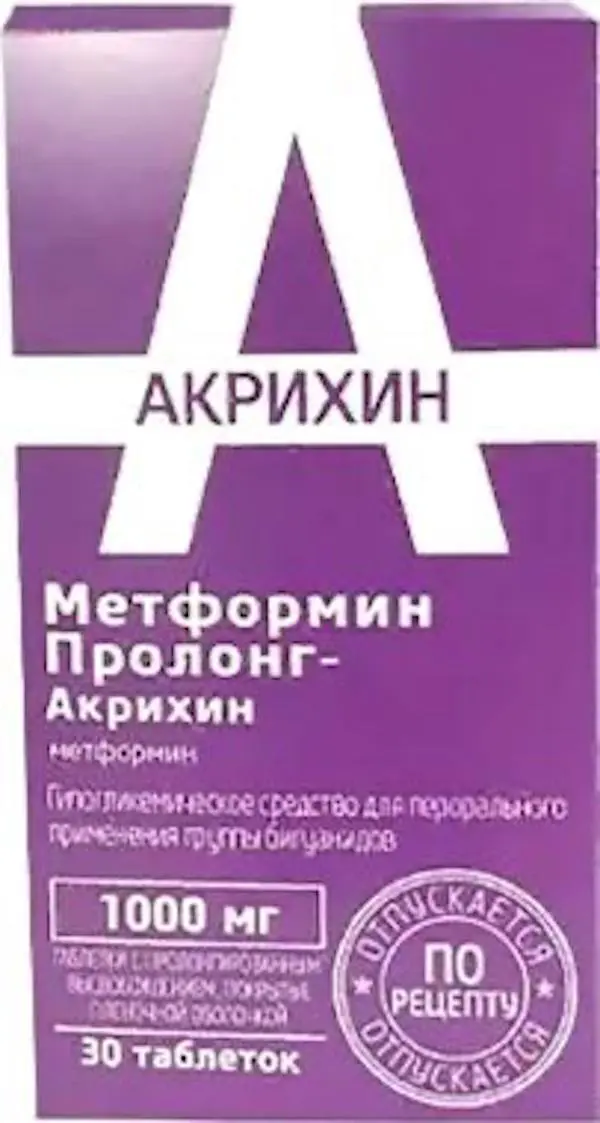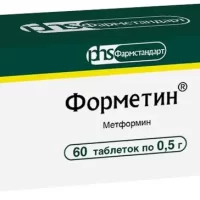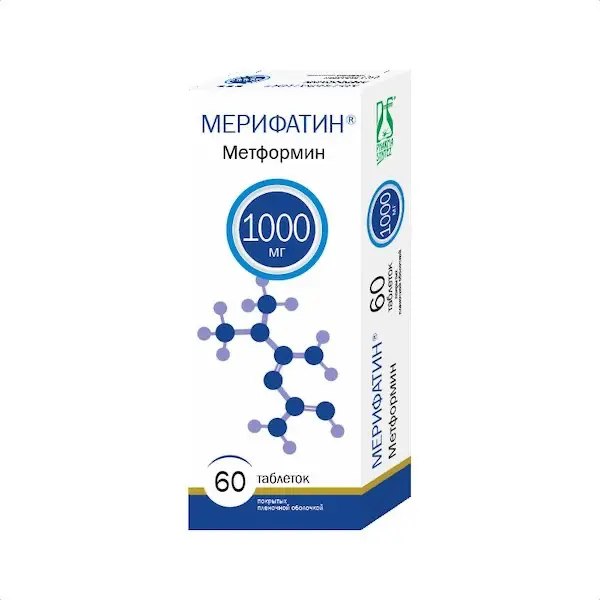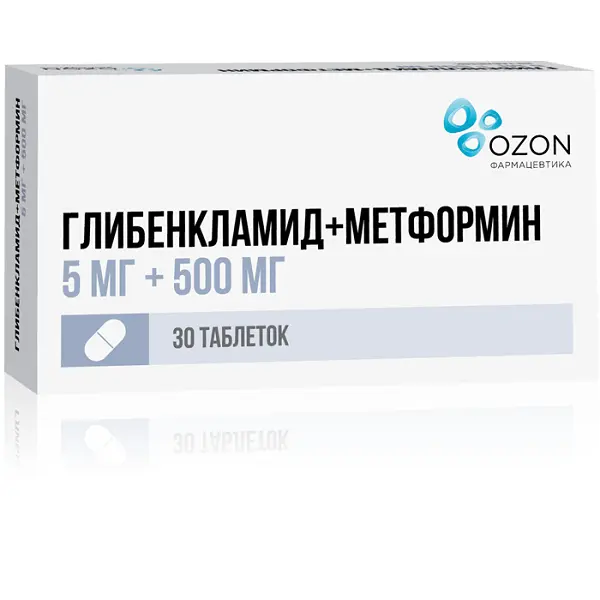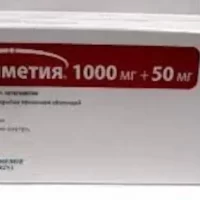Description
Metformin Prolong-Acrihin Pharmacodynamics
Metformin is a biguanide with hypoglycemic action, which reduces both basal and postprandial plasma glucose content. It does not stimulate insulin secretion and therefore does not cause hypoglycemia. Increases the sensitivity of peripheral receptors to insulin and glucose utilization by cells. Reduces glucose production by the liver by inhibiting gluconeogenesis and glycogenolysis. Delays the absorption of glucose in the intestine.
Metformin stimulates glycogen synthesis by acting on glycogen synthase. Increases the transport capacity of all types of membrane glucose transporters.
During metformin administration, the patient’s body weight either remains stable or decreases moderately.
Metformin has a favorable effect on lipid metabolism: it reduces the concentration of total cholesterol, low-density lipoproteins and triglycerides.
Indications
Diabetes mellitus type 2 in adults, especially in patients with obesity, with ineffectiveness of diet therapy and physical activity:
– As monotherapy;
– in combination with other oral hypoglycemic agents or with insulin.
Contraindications
– Hypersensitivity to metformin or any excipient;
– Diabetic ketoacidosis, diabetic precoma, coma;
– Renal insufficiency or impaired renal function (creatinine clearance less than 60 ml/min);
– acute conditions with risk of renal dysfunction: dehydration (with chronic or severe diarrhea, repeated bouts of vomiting), severe infectious diseases (e.g., respiratory tract infections, urinary tract infections), shock;
– clinically expressed manifestations of acute or chronic diseases that can lead to the development of tissue hypoxia (including heart or respiratory failure, acute myocardial infarction);
– major surgery and trauma when insulin therapy is indicated (see section “Special Indications”);
– hepatic insufficiency, liver dysfunction;
– chronic alcoholism; acute alcohol poisoning;
– pregnancy;
– lactoacidosis (including in anamnesis);
– use for less than 48 hours before and for 48 hours after radioisotopic or radiological studies with iodine-containing contrast agent (e.g., intravenous urography, angiography) (see section “Interaction with other medicinal products”);
– adherence to a hypocaloric diet (less than 1000 kcal/day);
– children under 18 years of age due to the lack of clinical data on its use.
Dosage and administration
- Metformin Prolong-Acrichine is taken orally. Tablets are swallowed whole, without chewing, with plenty of fluid, once a day during dinner. Dose of drug Metformin Prolong-Acrichine is chosen by a doctor individually for each patient on the basis of results of blood glucose concentration measurement. Monotherapy and combination therapy in combination with other hypoglycemic agents Initiation of therapy in patients not previously taking metformin In patients not taking metformin, the recommended initial dose of prolonged-acting metformin is 750 mg once daily with dinner. Every 10 to 15 days, it is recommended that the dose be adjusted based on plasma glucose concentration measurements. Slowly increasing the dose helps to reduce gastrointestinal side effects. The recommended dose of the drug Metformin Prolong-Acrichine is 2 tablets of 750 mg once a day. If the recommended dose fails to achieve adequate glycemic control, it is possible to increase the dose to the maximum – 3 tablets of 750 mg of the drug Metformin Prolong-Acrichine once a day.
- Transition from normal-release metformin
In patients taking metformin in the form of normal-release tablets, when switching to Metformin Prolong-Acrichine, the daily dose should be equivalent to the daily dose of normal-release metformin. Patients taking metformin in the form of normal-release tablets at a dose greater than 2000 mg are not recommended to switch to Metformin Prolong-Acrichine. - Switching from another hypoglycemic drug
If switching from another hypoglycemic drug, the other drug should be discontinued and Metformin Prolong-Acrichine should be started at the dose indicated above. Combination with insulin To achieve better glycemic control, metformin and insulin can be used as combination therapy. The usual starting dose of Metformin Prolong-Acrichine is one tablet of 750 mg once daily with dinner, while the dose of insulin is chosen based on blood glucose measurements. - Daily Dose
The maximum recommended dose of Metformin Prolong-Acrichine is 3 tablets daily (2250 mg). If adequate glycemic control is not achieved at the maximum recommended daily dose of Metformin Prolong-Acrichine, it is possible to switch to metformin with a normal release in a maximum daily dose of 3000 mg. - Skipping a dose
If the next dose is missed, the patient should take the next dose at the usual time. Do not take a double dose of Metformin Prolong-Acrichine. - Duration of the course of treatment Metformin Prolong-Acrichine should be taken daily, without interruption. In case of discontinuation of treatment, the patient should inform the doctor. Patients with renal insufficiency The drug can be used with renal insufficiency of moderate severity (creatinine clearance 45-59 ml/min) only in the absence of conditions that increase the risk of lactoacidosis. The initial dose is 750 mg once daily; the maximum dose is 1000 mg daily. Renal function should be closely monitored every 3-6 months. If creatinine clearance is below 45 ml/min, the drug should be stopped immediately.
- Elderly patients Elderly patients due to possible
decrease in renal function, the dose of metformin is adjusted based on regular renal function assessment (see Special Precautions”).

